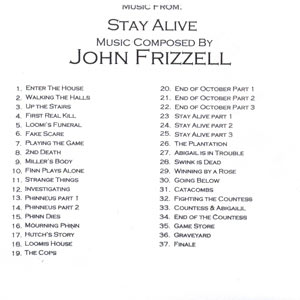Stay Alive
Music composed by John Frizzel
Performed by Unnamed Ensemble
Promotional Album
Running Time: 61:44

See also:
Ghost Ship The Prize Winner of Defiance, Ohio Stay Alive would never be a movie for which I’d expect an intelligent and fresh musical approach. Written and directed by William Brent Bell, this new teenage thriller tells the story of a group of teens who stumble upon a new video game called Stay Alive. This normally happy occurrence is put in dour context as gamers are murdered in the same method as the character they played in the very game.
This sort of film typically gets a very by-the-numbers score – a practical museum collection of stingers and thriller flourishes. However, composer John Frizzell took a novel approach, building on his experimental music forr Th13teen Ghosts and Ghost Ship. For Stay Alive, the orchestra was recorded and then heavily edited electronically in Apple’s Logic Pro to strengthen the percussive and rhythmic sections. At the same time they kept the original orchestral recordings on top for a uniquely cinematic aesthetic.
This editing approached yielded a particularly interesting rhythmic effect that imitates the sound a corrupted audio CD. It is a very angular, chopped sound somewhere in between a synthesizer and an orchestra and sometimes these manipulated sounds crossfade back and forth to the pure orchestral recordings. When combined with the fast and intense rhythmic string ostinati (suggestive of Herrmann and Hans Zimmer’s The Ring), these sounds are the basis for the entire work. The string ostinati are in pentads, in a 5/8 metre and on fast tempo, always stressing the first note of each bar and usually performed on low-pitched string instruments (celli and basses). This rhythmic emphasis is evident in cues like ‘Finn plays alone’ and the opening ‘Enter the house’.
The third and final characteristic of the score’s rhythmic structure is a techno-like electronic loop, also getting various renditions and repetitions. It appears throughout the score, notably in ‘Strange Things’, ‘Phinneus part 2’, and ‘The Cops’ (the most unhinged cue). Frizzell cleverly uses the rhythmic basis throughout the score through various inversions and renderings, along with techniques like reversing and interweaving, altogether resulting in extremely dense and intense pieces like ‘Stay Alive part 2’ and ‘Countess and Abigail’.
Despite the rhythmic emphasis, the score is not without an attractive melodic core, with two piano themes prominently featured. The first is reminiscent of James Newton Howard’s main piano theme for Unbreakable – but perhaps a tad creepier. It is heard in ‘Loomi’s funeral’ and ‘Catacombs’ among other cues. The second, heard in ‘Investigating’ and ‘Fighting the Countess’ is a calmer and more urban theme, also echoing James Newton Howard’s style. There are also isolated melodic passages, like ‘Hutch’s story’ where a warm cello leads a sad nostalgic slow piece together with the harp and smooth string orchestra. The gentle side of the composer shows towards the end of the score, in ‘End of the Countess’, a string-led piece with a very emotional cello motif, although it would have benefited from more detailed writing. Completing the score with melancholic piano and cello is ‘Graveyard’, followed by the maddest piece of the entire score, the string-led ‘Finale’. This last piece is tonally closer to the intense aesthetic that dominates the score.
John Frizzell is a composer generally known for his versatile and varicolored musical approaches, and this is a solid piece of film music from him. Make no mistake though - Stay Alive is a dissonant (sometimes he even moves into 12-tone/atonal musical territories), intense, complex and ominously dark beast of a score and not for everyone. However, it’s so well written and imaginative, with an impressively clear and aggressive texture, mainly due to accurate sound mixing and alternations of the playing techniques (such as the different bowings used on the string section), along with an intense and clear-cut rhythm section. Everything’s under such a crisp sound design and quality, it leaves you speechless. Stay Alive demands a regular release, as it is the answer to all those who consider modern horror film scoring to be flat and uninteresting. It’s early days yet, but John Frizzell might have easily delivered one of the most striking horror scores of the year.
Demetris Christodoulides
Rating:
4
Return to Reviews Index